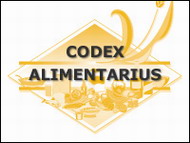Why You Should Care About Codex: Separating Fact from Fiction
November 27, 2012 Next week, ANH-USA will travel to Germany to represent YOU at the next Codex meeting. Here’s what to expect.
Next week, ANH-USA will travel to Germany to represent YOU at the next Codex meeting. Here’s what to expect.The Alliance for Natural Health USA has been selected to represent US consumers at the international Codex Committee on Nutrition and Foods for Special Dietary Uses (CCNFSDU), which will meet December 3–7 in Germany.
The Codex Alimentarius (Latin for “Food Code”) is a collection of internationally adopted food standards, guidelines, codes of practice, and other recommendations which supporters hope will become a global standard and also facilitate international trade. The CCNFSDU studies specific nutritional problems and advises the Codex Commission on general nutrition issues. They also develop guidelines for foods and supplements for special dietary uses, so having a seat at the table and being able to directly convey your concerns is a significant step forward for our consumer advocacy organization.
The Codex Commission’s decisions are far-reaching, and generally work to the advantage of the world’s most powerful countries and powerful industry members. Smaller countries and companies can easily get shut out of the process. We represent only the interests of the consumer, particularly the natural health community.
The Commission, through their various committees, addresses acceptable levels of pesticide residues, the amount of gluten allowed in gluten-free foods, GMOs and GMO labeling, infant formula, supplements, and contaminants in food. Regular Pulse readers will recall that we have some major concerns with the US adopting an international standard, particularly since the Commission usually follows the European Union, and the EU has adopted absurd limits on supplements— either banning them or allowing for sale only dosage strengths so low as to be completely ineffective.
Here are some of our concerns—and things we hope to help change by taking an active role in Codex discussions now and in the future:
- Genetically engineered plants and animals being globally accepted with little to no scientific vetting;
- Standards concerning “healthy food production systems” (i.e., organics) being dumbed down, and the approval of synthetic additives and processing aids in “organic” food, to better suit profit-driven corporate interests;
- The acceptance of dangerously high pesticide residue levels;
- Banning useful supplements or setting excessively low maximum daily doses based on scientifically flawed risk-assessment methods;
- Creating rules that may force foods or supplements into the drug category; and
- Creating an international requirement for hyper-expensive drug-style clinical trials before one can share any health information about a food or supplement.
December’s meeting will mainly be about supplements, recommended daily allowances (and the criteria for determining them), and the enrichment of foods (adding vitamins or minerals to them).
Contrary to many Internet rumors, governments are not required to adopt Codex standards, so the effects of any Codex decisions are never immediate and are drawn out over many years. In the US, the process for adopting Codex standards can occur either through legislation or through the regulatory process—and of course citizens have a say in that! In fact, Congress has passed a law stating that Codex standards will not supersede domestic laws.
At the same time, however, Congress has passed other legislation stating that federal agencies must or should consider some Codex standards as part of the regulatory process—which may incorporate Codex into US standards with little fanfare. For example:
- The Food Quality Protection Act states that FDA must consider Codex maximum levels when establishing tolerance for pesticide chemical residue in or on food. If the agency decides to depart from the Codex standards, they have to provide an explanation for public comment.
- Under the Animal Drug Availability Act, in establishing tolerance levels of drugs, the FDA may consider and rely on Codex standards.
- The FDA Food Safety Modernization Act (which we reported on extensively) required the FDA to provide recommendations on whether and how US should harmonize with Codex requirements. This opens the door towards much greater harmonization with Codex standards. Fortunately, ANH-USA secured a big victory by exempting dietary supplements from this provision.
Harmonizing US standards with Codex is worrisome, and we are pleased to be able to participate in the CCNFSDU’s decision-making process. We will report back after the meeting, and will keep you updated as we represent your concerns on the international stage and work to protect your rights.

No comments:
Post a Comment